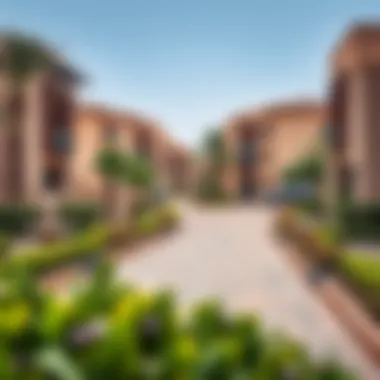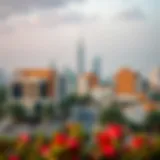Navigating Dubai's Real Estate: Nine Key Dimensions


Intro
Dubai’s real estate landscape is not merely a collection of buildings and properties; it's an intricate tapestry woven with the threads of economic growth, cultural diversity, and innovative design. For anyone keen on understanding this vibrant market, grasping its unique dimensions is crucial. Amidst towering skyscrapers and luxurious villas lies a world of opportunities waiting to be explored. It’s essential to navigate through this terrain to make informed decisions, whether you are an investor, a homeowner, or a newcomer yearning for a slice of this dynamic city.
The distinct dimensions of Dubai's real estate market embody the interplay between market trends, investment prospects, neighborhood nuances, and lifestyle considerations. From the bustling streets of Downtown Dubai to the serene shores of Palm Jumeirah, each area beckons with a promise of diverse experiences and opportunities.
This article dives deep into these nine dimensions, dissecting the fundamental components that influence property decisions and investment strategies. With a focus on clarity and insight, we aim to equip you with the necessary knowledge to navigate this promising landscape expertly.
Intro to Dubai's Real Estate Market
The dynamics of Dubai's real estate market present an intricate fabric woven with economic, cultural, and regulatory threads. Understanding this landscape is vital for a plethora of reasons. For starters, Dubai stands as a beacon of growth in the Middle East, attracting investors, expatriates, and homebuyers from around the globe. As the city continues to expand, it becomes increasingly essential for potential investors and residents to grasp the key elements that shape this market. Knowing what to look for can make the difference between a bright investment opportunity and a questionable venture.
The importance of exploring Dubai's real estate market lies not only in its financial implications but also in the lifestyle that comes with it. Property acquisition in Dubai is not merely a transaction; it's about choosing a way of life, a community environment, and a future blueprint. This article seeks to illuminate various dimensions that govern the property landscape in Dubai. From bustling downtown high-rises to tranquil suburban villas, understanding these elements can empower individuals to navigate their real estate choices with clarity and foresight.
Overview of the Market Landscape
Diving into the market landscape reveals a tapestry rich with diversity. The real estate sector in Dubai is characterized by variety in property types, from luxury apartments boasting stunning views of the Burj Khalifa to more affordable options in up-and-coming neighborhoods. The residential scene thrives alongside commercial and industrial properties, catering to a myriad of needs and preferences.
Factors such as population growth and urban development are driving demand, anchoring property values across the board. Moreover, both local and foreign investors are increasingly perceiving Dubai as a stable haven for investment due to its strategic location and favorable tax environment. Various initiatives, such as long-term visas for investors and expats, foster an appealing climate for property investment. It’s a place where opportunity walks hand-in-hand with ambition.
Significance of Understanding the Nine Dimensions
Grasping the nine dimensions of Dubai's real estate landscape is paramount for stakeholders. Each dimension offers a lens through which to view market trends, investment opportunities, and lifestyle choices. For those considering entering the market, these insights are invaluable. Investors can leverage this understanding to pinpoint sectors that are ripe for investment or to identify potential pitfalls that may otherwise lead to poor decisions.
This analysis serves as a foundational compass, guiding new entrants and seasoned players alike toward informed real estate decisions. The complexity of this landscape necessitates a thoughtful approach, one that weighs not only immediate gains but also sustainable growth and community impact. As Dubai continues to evolve, so too must our understanding of its real estate market.
"To navigate the intricate pathways of Dubai's real estate is to hold the key to future opportunities and lifestyle enhancements."
Maintaining an awareness of the various dimensions enables individuals to align their personal or business goals with the broader opportunities available within this vibrant market.
Economic Factors Influencing Real Estate
Understanding economic factors is crucial when navigating the dynamic real estate landscape in Dubai. This section enables investors, homeowners, and agents to grasp how macroeconomic variables shape property values, demand, and supply within the market. Economic conditions, such as growth rates, inflation, and employment levels, directly influence buying patterns and long-term investment strategies. Therefore, being informed about these dimensions can lead to wiser decisions and ultimately increase the likelihood of achieving favorable investment outcomes.
Economic Growth and Its Impact
Economic growth in Dubai has been nothing short of remarkable over the past few decades. The city has positioned itself as a global hub for trade, tourism, and investment, resulting in a booming economy. With factors like the Expo 2020 contributing substantially to job creation and infrastructure development, the ripple effects are felt across the real estate sector.
- Job Creation: As companies establish offices in Dubai, job opportunities multiply, resulting in increased demand for residential and commercial properties. A surge in job seekers from various backgrounds adds to the rental market, forcing landlords to adjust their pricing strategies.
- Increased Incomes: A growing economy usually means higher disposable incomes for residents. This translates to a rising appetite for properties that offer luxury amenities and prime locations. Investors should keep a close eye on wage growth statistics, as they often drive residential real estate demand significantly.
- Investment in Infrastructure: The government’s continuous investment in infrastructure—from roads to public transport—enhances the overall appeal of different neighborhoods. Investors who purchase properties in well-connected areas may see their values appreciate as accessibility improves.
"Economic growth acts as a barometer for property viability; an upturn signifies opportunities, while a downturn signals caution."
Inflation Trends and Property Values
Inflation plays a pivotal role in shaping property values in Dubai. Rising prices can affect everything from construction costs to buyer sentiment, so monitoring inflation trends is essential for all involved in the real estate market.
- Impact on Construction Costs: Higher inflation rates generally lead to increased costs for construction materials and labor. This can delay new projects or inflate the price of existing houses, ultimately reducing affordability for some buyers, especially first-time home purchasers.
- Interest Rates: As inflation rises, central banks, including the Emirates Central Bank, might respond by increasing interest rates. This, in turn, can lead to higher mortgage costs, further impacting purchasing power and potentially cooling off the housing market.
- Price Adjustment: Buyers often recalibrate their expectations when inflation is at play. What once seemed affordable might feel out of reach, which could push some buyers to wait for prices to stabilize. Savvy investors who recognize these shifts may uncover opportunities by purchasing properties that are undervalued due to temporary market hesitance.
In summary, economic conditions are a critical lens for understanding and navigating Dubai's real estate market. High-growth rates and inflation trends must be closely monitored not just for immediate market dynamics but also for long-term forecasting. Keeping a finger on this pulse provides valuable insights that can serve as a compass in the often tumultuous waters of property investment.
Regulatory Environment and Policies
The realm of real estate is often framed by the rules and regulations that govern it, making the understanding of regulatory environment and policies imperative. In Dubai, this landscape is multifaceted and serves as both a guiding light and a complex web for investors, homeowners, and expatriates alike. The pertinent laws not only dictate property ownership but also shape foreign investment opportunities. Familiarizing oneself with these regulations amounts to better preparation for making informed decisions in an ever-evolving market.
Property Ownership Laws
Dubai's property ownership laws are unique. First off, the freehold property model allows foreign nationals to own real estate in specific areas of the emirate. This was a groundbreaking shift that spurred rapid interest in Dubai from international investors. However, not all areas are created equal. It’s essential to note that some locations are designated for leasehold agreements rather than outright ownership. Thus, a buyer must verify the ownership status before investing.
For instance, the Dubai Land Department plays a crucial role in this regulation, ensuring transparency in property transactions. The registration process may seem tedious, yet it protects all parties involved. Additionally, familiarizing yourself with the service charges and maintenance fees applicable to various properties can prevent unforeseen costs down the line.
Moreover, while the laws might seem inviting, there are still restrictions on foreign ownership in specific developments. Buyers should be aware that even within freehold areas, some projects may impose additional restrictions that can affect long-term investment potential.


"Understanding the ownership laws is not just about purchasing a property; it’s about securing a future in Dubai."
Foreign Investment Regulations
When it comes to foreign investment, Dubai has made strides to attract global capital. Regulations favor foreigners seeking to invest, but they come with their own set of nuances. For instance, there are specific zones, like the Dubai International Financial Centre, where foreign investors enjoy 100% ownership in commercial ventures. This is a boon for entrepreneurs looking to establish a foothold in the region.
However, foreign investors must navigate the different types of legal structures available. For example, creating a Limited Liability Company (LLC) in Dubai requires a local sponsor who holds at least 51% of the shares, which can complicate matters. Therefore, doing due diligence and perhaps consulting with local legal experts can be a wise move.
On another note, investors should also be aware of the tax incentives that Dubai offers, including the absence of property taxes and a lack of capital gains tax for foreigners. This makes the local market rather unique compared to other global hubs. In essence, understanding these regulations allows investors to craft a strategy that leverages Dubai's favorable environment effectively.
In summary, becoming well-acquainted with the regulatory environment is crucial for anyone looking to invest in Dubai's real estate sector. Successful navigation of ownership laws and foreign investment regulations can yield fruitful opportunities.
Neighborhood Dynamics
Understanding neighborhood dynamics is pivotal when navigating Dubai's real estate landscape. The essence of a neighborhood extends beyond mere geographical location; it encapsulates lifestyle, community vibe, and investment potential. In this vibrant city, varying neighborhoods cater to contrasting demographics, preferences, and budgets. Therefore, knowing these elements is essential for potential investors or homeowners keen on making informed decisions.
The dynamics of a neighborhood can significantly impact property values and resident satisfaction. For instance, some areas might thrive on a multicultural aura, attracting expatriates, while others may offer hidden gems with strong local community ties. This fluctuation in neighborhood character can often serve as a bellwether for upcoming trends and market shifts.
Moreover, comprehending neighborhood development often correlates directly to personal satisfaction. An area that suits an investor’s lifestyle often fosters a higher long-term commitment to the property, rendering neighborhood dynamics not only a facet of real estate but a cornerstone of lifestyle choices as well.
Emerging Neighborhoods to Watch
As Dubai evolves, so do its neighborhoods. Some of these emerging locales are gaining traction, thanks to innovative developments and community engagement. Keeping an eye on these developments can reveal lucrative opportunities.
Trends in New Developments
Emerging neighborhoods are marked by innovative designs and sustainable practices. These areas often spring up in response to the shifting demographics of Dubai, where people seek a blend of modernity and connection to their surroundings. One key characteristic of these trends is mixed-use developments, where residential spaces coexist harmoniously with shopping, leisure, and work environments.
Why is this a popular choice? It caters to the fast-paced lifestyle many residents lead, allowing them to balance work-life seamlessly. A unique feature of these developments is their focus on eco-friendly architecture and smart city concepts. They come with built-in technologies for lower energy consumption and sustainable living, appealing immensely to environmentally conscious buyers.
There are advantages and disadvantages to consider. The upside is an enhanced quality of life, but with rapid growth can come challenges such as congestion and growing pains as the infrastructure adapts to increased demand.
Community Amenities and Infrastructure
The importance of robust community amenities cannot be overstated in any real estate development. Emerging neighborhoods, in particular, capitalize on this aspect, focusing on building not just properties but vibrant communities. A critical characteristic of these areas is their emphasis on social infrastructure, along with essential services like healthcare, schools, and recreational spaces.
These amenities promote interaction among residents, fostering a sense of belonging. What makes this attractive? The availability of parks, gyms, and cafes can pull in families and professionals alike, turning a locality into a desired living destination.
On the flip side, while having ample amenities is beneficial, not all areas might experience equally prompt establishment of these facilities. Sometimes, the promise of future developments doesn't align with initial living conditions, leading to dissatisfaction.
Established Areas and Their Appeal
On the other hand, established areas like Dubai Marina or Jumeirah Beach Residence hold a timeless appeal. They represent stable investments, often with a proven track record of high returns. The allure of these locations is typically rooted in their vibrant culture, existing infrastructure, and accessibility to amenities previously discussed.
Residents often find comfort in the familiarity and established community dynamics, making it a safer bet for those wary of the uncertainties that emerging neighborhoods may bring. While the price tag might be heftier, the allure of a well-rounded, established community often simplifies the decision-making process for investors or homebuyers.
Ultimately, the key takeaway is that each neighborhood in Dubai offers a unique blend of benefits and challenges, making a thorough understanding of these dynamics essential for anyone looking to make waves in the locality's real estate market.
Market Trends and Insights
Understanding the current market trends and insights is crucial for anyone looking at Dubai’s real estate scene. The real estate landscape in Dubai is known for its dynamic nature, influenced by a blend of economic factors, cultural shifts, and regulatory changes. This fluidity creates a variety of opportunities for investors and homebuyers but also necessitates a keen awareness of prevailing trends to navigate this marketplace effectively.
The relevance of this topic cannot be overstated; being informed about market trends allows investors to make calculated decisions. Knowing when to buy or sell, identifying emerging neighborhoods, and understanding investor sentiment are all strategic considerations that can lead to greater profits and successful investments. Thus, analyzing these trends not only assists in mitigating risks but also enhances the potential for capital appreciation.
"The key to success in real estate is understanding the local market dynamics and being ready to pivot in response to changes."
Current Market Trends
Presently, the Dubai real estate market is witnessing a number of noteworthy trends. First, we see a surge in demand for residential properties driven largely by expatriates seeking affordable housing and amenities. Areas like Dubai Marina and Downtown Dubai continue to attract significant interest due to their vibrant lifestyle offerings.
Moreover, sustainability is becoming a key player in development practices. New properties are increasingly being designed with eco-friendly materials, energy-efficient systems, and sustainable technologies, reflecting the rising global consciousness about environmental issues.
Additionally, digital transformation is reshaping how properties are marketed and sold. Virtual tours and augmented reality apps are helping potential buyers explore properties remotely, providing a more immersive experience even before stepping through the door. This shift not only appeals to international buyers but also streamlines the buying process, making it more accessible than ever.


Predicted Market Developments
Looking ahead, several developments are anticipated to shape Dubai's real estate market in the coming years. Firstly, infrastructure projects are poised to significantly enhance connectivity. The ongoing expansion of Dubai's metro system and the construction of new roadways aim to streamline transport, thus opening up previously underdeveloped areas as attractive options for investment.
One major development expected is the impact of the Expo 2020 legacy. Following the event, areas once focused on infrastructure for the expo will likely be repurposed, maintaining their appeal as residential and commercial hubs. Such developments can drive property values up in those locations.
Furthermore, the market is expected to see increasing institutional investment as more funds recognize the potential returns available in Dubai’s real estate scene. This influx of capital could lead to higher property prices, especially in prime areas, which may further squeeze middle-class buyers out of the market.
Investment Opportunities in Dubai
Investment in real estate in Dubai offers a golden ticket for savvy investors. The unique blend of economic stability, modern infrastructure, and attractive returns makes Dubai a prime location for property investment. Investors are often drawn to the rapidly evolving market that promises long-term gains. The opportunities vary widely, ranging from residential and commercial properties to luxury developments and vacation rentals.
High-Yield Investment Areas
When it comes to high-yield investment areas, locations like Dubai Marina, Downtown Dubai, and Jumeirah Beach Residence stand out. These neighborhoods are often bustling with activity due to their proximity to landmarks, beaches, and shopping centers. They are considered prime spots for both short-term rentals and long-term leasing.
- Dubai Marina: This area boasts a vibrant lifestyle with waterfront views, attracting both residents and tourists. Investors can expect high occupancy rates and attractive rental yields.
- Downtown Dubai: Home to the Burj Khalifa and Dubai Mall, this area draws in a substantial number of visitors, making it a hotspot for those looking to rent short term.
- Jumeirah Beach Residence (JBR): Its beachfront properties cater to expatriates and affluent tourists, ensuring robust rental demand throughout the year.
Investors should also consider logistics and accessibility to transport hubs, as areas with better connectivity often yield higher returns. Sprawling developments like Dubai South are emerging as lucrative options with long-term potential. Understanding these dynamics can help investors make informed decisions about where to put their money.
Long-term vs. Short-term Investments
Deciding between long-term and short-term investments in Dubai requires a firm grasp of market dynamics and personal investment goals.
- Long-term Investments: This strategy suits investors who aim for stability and predictable cash flow. Properties in established neighborhoods such as Arabian Ranches or villa communities often yield consistent returns due to steady demand. Holding these assets over an extended period can also hedge against market fluctuations.
- Short-term Investments: On the flip side, short-term investments like holiday rentals can generate significant returns quickly. Properties in prime tourist areas often attract high rental rates during peak seasons, contributing to rapid capital appreciation. This route necessitates active management, but the profits can be substantial, especially if the property is well-marketed.
In the investment landscape of Dubai, both strategies have distinct advantages. An investor's choice often hinges on their financial goals, risk tolerance, and management preferences. Balancing both long-term and short-term strategies can enhance an investor's portfolio and minimize risks while maximizing returns.
Investing in Dubai’s real estate market is like riding a wave; understanding the region’s tide can lead to fruitful opportunities.
The combination of high-yield areas and a strategic approach toward investments is essential for anyone looking to thrive in Dubai's real estate sector.
Lifestyle Considerations
Lifestyle considerations play a pivotal role in shaping real estate dynamics in Dubai. They offer a lens through which investors and residents can gauge the attractiveness of various neighborhoods and property types. From cultural elements to modern amenities, understanding these aspects helps potential buyers align their choices with their personal values and needs, thus fostering a satisfying living experience.
Cultural Elements Shaping Preferences
Cultural factors deeply influence property choices in Dubai. With its diverse population, the city is a melting pot of traditions, beliefs, and lifestyles. This cultural richness affects everything from architectural styles to the types of community events available.
For example, expatriates from Europe may lean towards modern residential towers in areas like Dubai Marina, appreciating the contemporary design and vibrant social scene. On the other hand, families from the Middle East might favor developments in communities like Jumeirah, where local culture is more pronounced, and traditional amenities are accessible. Such preferences are significant not just for personal satisfaction but also for long-term property value.
Modern Living and Amenities
Modern living in Dubai's real estate market is often defined by an array of amenities that go beyond basic needs. Homebuyers today look for properties that enhance their quality of life.
Recreational Facilities
Recreational facilities are a cornerstone of Dubai’s lifestyle offerings. These spaces include parks, gyms, swimming pools, and sports complexes that cater to an active lifestyle.
Key characteristics: The availability of recreational facilities is a major pull factor for many buyers. Whether it’s the serene parks of Al Barsha or the state-of-the-art fitness centers in Downtown Dubai, these amenities offer residents a chance to unwind and stay fit, making them highly sought after.
Unique features: Many properties come with integrated recreational spaces, like rooftop gardens and communal gyms. These additions not only promote physical health but also foster community interaction, which is a unique advantage for residents looking to build relationships.
Accessibility and Transportation
Accessibility and transportation heavily influence lifestyle and investment decisions. Dubai's extensive public transport network, including the Metro and tram systems, ensures that residents can navigate the city with ease.
Key characteristic: The connectivity between major areas and the closeness to key facilities—such as schools, hospitals, and shopping centers—can greatly enhance the desirability of a neighborhood. Buyers often prioritize areas with seamless transport links.
Unique features: Dubai's commitment to developing sustainable transport options, like electric buses and bike lanes, showcases a forward-thinking approach in urban planning. However, potential disadvantages include the possibility of traffic congestion during peak hours, which might deter some from choosing properties in certain districts.


"In real estate, the right lifestyle considerations can elevate a property from merely a house to a cherished home."
In summary, lifestyle considerations comprise a critical aspect of Dubai's real estate landscape. Through cultural preferences, recreational facilities, and transportation accessibility, buyers can make informed decisions that resonate with their living standards and enhance their investment validity. Such insights not only guide individuals but also shape strategic developments within the booming real estate sector.
Future Outlook for Dubai's Real Estate
The future outlook for Dubai's real estate sector is a subject of keen interest for numerous stakeholders, from investors and homeowners to analysts and agents. Understanding where the market is headed not only enables better investment decisions but also helps in navigating potential challenges that may arise. As the cosmopolitan city continues to evolve, several factors will shape its future, particularly economic growth and technological advancements. This section takes a closer look at these elements, exploring their implications for real estate dynamics.
Projected Economic Growth
Dubai's economy is projected to experience notable growth in the upcoming years, driven largely by diversification and innovation. The government’s vision to reduce dependency on oil revenues and invest in sectors such as tourism, technology, and renewable energy is likely to result in an economic boom. A few key indicators of this anticipated growth include:
- Increase in GDP: The gross domestic product (GDP) is expected to rise, fostering a favorable environment for real estate investment.
- Rise in Infrastructural Spending: Ongoing large-scale projects, like the Expo 2020 site transformation, will further enhance the city's appeal to investors.
- Boost in Job Creation: As various industries grow, employment opportunities will increase, leading to an influx of expatriates who will seek housing in the city.
This growth will likely propel property values, thereby creating a competitive market that rewards savvy investors. However, it's crucial to remain vigilant about fluctuations that could arise due to global economic factors or political climates.
The Role of Technology in Real Estate
In recent years, technology has begun to play a fundamental role in reshaping Dubai's real estate landscape. Innovations such as property management software, AI-driven analytics, and virtual reality property tours have transformed how properties are marketed and sold. Some pertinent points regarding technology’s impact include:
- Streamlining Transactions: Digital platforms simplify the buying and selling process, making it more accessible.
- Enhancing Customer Experience: Virtual reality allows potential buyers to tour properties from the comfort of their homes, expanding their options.
- Data Analytics: Utilizing big data helps investors analyze market trends and make informed decisions on property investments.
"Technology is not just a trend; it's a fundamental shift in how real estate operates, providing faster transactions and deeper insights that can guide strategies for future investments."
As technology continues to evolve, embracing these advancements will be essential for real estate professionals and investors alike, playing a pivotal role in maintaining competitive advantage within this dynamic market. Overall, balancing economic growth with technological integration will be crucial in forging a robust future for Dubai's real estate sector.
Challenges Facing the Real Estate Sector
When it comes to the intriguing and constantly evolving real estate sector in Dubai, understanding the challenges that arise is essential. These hurdles can be significant, influencing not only real estate prices but also investment decisions for potential buyers, considerers, and economic players. Gaining insight into these challenges offers clarity and preparedness in navigating this complex market.
Market Saturation and Its Effects
Dubai's real estate landscape, once hailed for its rapid growth and limitless potential, faces the pressing challenge of market saturation. In recent years, a noteworthy influx of developments has taken place. This boom has led to numerous properties available across different segments, potentially outstripping demand. Consequently, investors might find themselves in a buyer's market, where the abundance of stock drives down prices and increased competition among sellers.
Market saturation influences the overall health of the real estate market. A softer market can lead to rising vacancies in both residential and commercial properties. Investors should be aware that excess supply may lead to lower rental yields or property values that may not appreciate as quickly as in a more balanced market.
To navigate this predicament, investors are advised to conduct thorough due diligence, focusing on the specific areas experiencing demand, developments that align with buyer needs, and even properties that offer unique selling points that distinguish them from the glut of choices available.
Regulatory Hurdles for Investors
Equally significant are the regulatory hurdles that investors face in Dubai's real estate market. While the emirate has made notable strides in creating an environment friendly to foreign investors, various laws and regulations can sometimes complicate matters. For instance, understanding property ownership laws can be a maze for non-residents and foreign corporations, as different rules apply depending on the type of property and location.
Additionally, there are frequent changes to regulations, which can create uncertainty in the market. Investors must stay informed about current laws concerning property taxation, ownership rights, and even the approval process for new developments. Compliance with these regulations is crucial, as failing to do so can lead to severe financial and legal repercussions.
For anyone looking to invest in Dubai's real estate, consulting with a legal expert familiar with local laws is often a wise step. This approach not only helps them navigate existing regulatory frameworks but also allows investors to plan for potential changes that could affect the market.
Overall, while challenges like market saturation and regulatory hurdles can seem daunting, they provide essential insights for those looking to engage with Dubai's real estate landscape. By facing these complexities with informed strategies, investors can better position themselves in this vibrant yet intricate market.
The End
In the ever-evolving realm of Dubai's real estate market, concluding insight is much like wrapping up a sumptuous meal. It reflects on all the flavors experienced throughout the journey. This article has meticulously explored nine dimensions that shape the unique dynamics of the Dubai property scene. With each dimension providing a different lens through which to view the market, potential investors and residents are better equipped to make informed decisions.
Summary of Key Insights
Throughout the exploration, several crucial insights have emerged:
- Economic Influences: Robust economic growth paired with fluctuating inflation rates impacts property values significantly. Keeping an eye on these factors is essential for navigating investments.
- Regulatory Framework: Understanding property ownership laws and foreign investment regulations is pivotal for anyone keen on engaging with the market.
- Neighborhood Dynamics: The vibrancy of emerging neighborhoods like Dubai Creek Harbour presents opportunities for investments that cater to modern lifestyles.
- Market Trends: Staying informed about current and predicted market developments can guide smart choices that align with both immediate needs and long-term vision.
- Lifestyle Awareness: Cultural elements and modern amenities shape the preferences of homebuyers, making it critical for investors to tailor their offerings based on these insights.
Each of these elements weaves together a more comprehensive viewpoint, allowing stakeholders to navigate the complexities with increased confidence.
Final Remarks on Investment Viability
As we wrap up our discussion, it’s clear that Dubai's real estate market is not merely a sea of options; it’s a landscape rich with potential. However, it is essential for investors to proceed with caution and diligence. The property sector, while promising, is not without its hurdles. Regulatory challenges can sometimes feel like swimming against the tide, but those willing to embrace the learning curve often emerge successfully.
In closing, the viability of investing in Dubai's real estate hinges upon understanding these multifaceted dimensions. Key considerations include:
- Familiarity with local laws and market trends to mitigate risks.
- Thorough research into neighborhood growth patterns to capitalize on rising areas.
- An awareness of cultural factors that influence buyer preferences.
Ultimately, informed decisions and an understanding of the intricate layers at play in Dubai's real estate landscape can lead to fruitful ventures.







